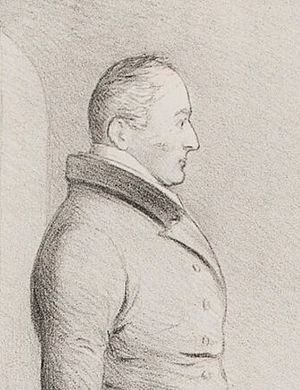Henry Parnell, 1st Baron Congleton facts for kids
Quick facts for kids
The Lord Congleton
|
|
|---|---|
 |
|
| Paymaster General | |
| In office 27 April 1836 – 19 June 1841 |
|
| Monarch | William IV Victoria |
| Prime Minister | The Viscount Melbourne |
| Preceded by | Office established |
| Succeeded by | Hon. Edward Stanley |
| Personal details | |
| Born | 3 July 1776 |
| Died | 8 June 1842 (aged 65) |
| Nationality | Irish |
| Political party | Whig |
| Spouses | Lady Caroline Damer (d. 1861) |
| Alma mater | Trinity College, Cambridge |
Henry Brooke Parnell, 1st Baron Congleton (born July 3, 1776 – died June 8, 1842) was an important Irish politician and writer. He was known as Sir Henry Parnell, Bt for many years. He belonged to the Whig political party, which was a major group in British politics at the time. He served in the government during the 1830s under leaders like Lord Grey and Lord Melbourne. Parnell also wrote many books about money, government spending, and even how to build roads. He was the great-uncle of Charles Stewart Parnell, a famous Irish nationalist leader.
Contents
Early Life and Education
Henry Brooke Parnell was born into an important family. His father, Sir John Parnell, 2nd Baronet, was a top financial official in Ireland. Henry was the second son. He went to Eton, a famous school, and then to Trinity College, Cambridge, a well-known university.
In 1801, Henry inherited his family's lands in Queen's County, Ireland. This happened because of a special law passed in 1789. In 1812, he became the fourth Baronet, which is a title of honor, after his brother passed away.
Political Career Highlights
Parnell began his political journey in the Irish House of Commons, representing Maryborough from 1798. After the Act of Union in 1801, which joined Ireland and Great Britain, he moved to the Parliament of the United Kingdom.
Serving in Parliament
He was elected to represent Queen's County in 1802. Later that year, he briefly represented Portarlington. In 1806, he was again elected for Queen's County, a seat he held until 1832.
In 1828, Parnell led a special committee. This committee looked at how the government spent money. They suggested getting rid of the Navy Board, which had managed the navy for 280 years. Its duties were then moved to the Board of Admiralty.
Government Roles and Achievements
Parnell played a key role in 1830 when his proposal about government spending led to the defeat of the government led by the Duke of Wellington. This allowed the Whig party to take power.
In 1831, Parnell became a member of the Privy Council, a group of advisors to the monarch. He was also made Secretary at War, a role where he managed the army's finances and administration. He held this job until 1833.
After a short break, he returned to Parliament in 1833, representing Dundee. When the Whigs formed a new government in 1835, Parnell was given important financial roles. He became Paymaster of the Forces and also managed money for the navy. These jobs were combined in 1836 into the role of Paymaster General. He kept this important position until the government changed in 1841. In that same year, he was given the title Baron Congleton, making him a peer.
Important Writings and Ideas
Henry Brooke Parnell was a very active writer. He published many books and pamphlets about money, government, and other important topics.
Financial Reforms and Economic Views
One of his most important books was On Financial Reform, published in 1830. In this book, Parnell argued against the idea of protectionism, which meant putting high taxes on goods from other countries. He believed in reducing government spending, especially on the military.
Parnell suggested getting rid of taxes on raw materials and goods made in Britain. He also wanted to lower taxes on imported items like tea, sugar, and wine. To make up for the lost tax money, he proposed bringing back the income tax. His ideas in On Financial Reform were very influential. They helped shape the financial policies that later politicians like Peel and Gladstone put into practice.
Parnell was also a supporter of "free banking". He thought that allowing many banks to issue their own banknotes would make the economy more stable. This was different from others who wanted strict rules on how much money banks could print. However, after Parnell's death, his ideas about free banking became less popular. In 1844, a new law gave the Bank of England a monopoly on issuing banknotes.
Other Topics in His Works
Besides finance, Parnell also wrote about penal matters, which are about laws and punishment. He also wrote about civil engineering. His book A Treatise on Roads (1833 and 1838 editions) explained the methods used by the famous engineer Thomas Telford to build roads.
Family Life
In 1801, Henry Brooke Parnell married Lady Caroline Elizabeth. She was the daughter of John Dawson, 1st Earl of Portarlington. Henry and Caroline had three sons and three daughters who grew up to be adults.
One of their daughters, Frances Louisa, sadly passed away when she was five years old. She was buried in Westminster Abbey, a very famous church in London. Her monument there has a special message from her mother.
 | May Edward Chinn |
 | Rebecca Cole |
 | Alexa Canady |
 | Dorothy Lavinia Brown |

